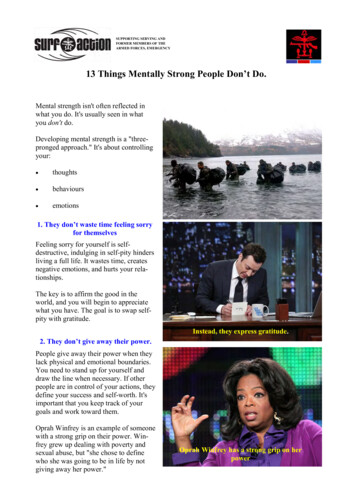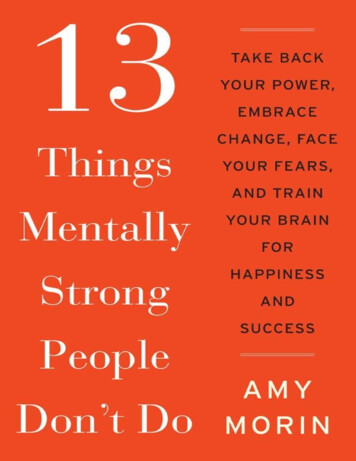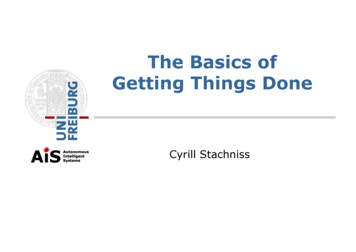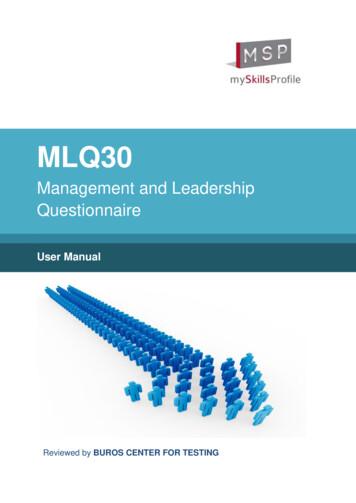
Transcription
SUPPORTING SERVING ANDFORMER MEMBERS OF THEARMED FORCES, EMERGENCY13 Things Mentally Strong People Don’t Do.Mental strength isn't often reflected inwhat you do. It's usually seen in whatyou don't do.Developing mental strength is a "threepronged approach." It's about controllingyour: thoughts behaviours emotions1. They don’t waste time feeling sorryfor themselvesFeeling sorry for yourself is selfdestructive, indulging in self-pity hindersliving a full life. It wastes time, createsnegative emotions, and hurts your relationships.The key is to affirm the good in theworld, and you will begin to appreciatewhat you have. The goal is to swap selfpity with gratitude.Instead, they express gratitude.2. They don’t give away their power.People give away their power when theylack physical and emotional boundaries.You need to stand up for yourself anddraw the line when necessary. If otherpeople are in control of your actions, theydefine your success and self-worth. It'simportant that you keep track of yourgoals and work toward them.Oprah Winfrey is an example of someonewith a strong grip on their power. Winfrey grew up dealing with poverty andsexual abuse, but "she chose to definewho she was going to be in life by notgiving away her power."Oprah Winfrey has a strong grip on herpower
3. They do not shy away from changeThere are five stages of change: precontemplation, contemplation, preparation, action, and maintenance.Following through with each of the fivesteps is crucial. Making changes can befrightening, but shying away from themprevents growth. The longer you wait,the harder it gets. Other people will outgrow you.Rather, they embrace the inevitable4. They don’t concentrate on thingswhich they can’t controlIt feels so safe to have everything undercontrol, but thinking we have the power toalways pull the strings can become problematic. Trying to be in control of everything is likely a response to anxiety.Rather than focusing on managing youranxiety, you try controlling your environment. Shifting your focus off the thingsyou can't control can create increasedhappiness, less stress, better relationships,new opportunities, and more success.Instead, they focus on what they can do5. They don’t worry about pleasing everyoneOften we judge ourselves by consideringwhat other people think of us, which isthe opposite of mental toughness. Thosewho are constantly trying to be a peoplepleaser will find: It's a waste of time; people-pleasers are easily manipulated; it'sOK for others to feel angry or disappointed; and you can't please everyone.Dropping your people-pleasing mindsetwill make you stronger and more selfconfident.Indeed, they're able to say "no."
6. They don’t fear taking calculatedrisksPeople are often afraid to take risks,whether it's financial, physical, emotional,social, or business-related but it comesdown to knowledge. A lack of knowledgeabout how to calculate risk leads to increased fear.To better analyse a risk, ask yourself thefollowing questions. What are the potential costs?Instead, they prepare for what's ahead What are the potential benefits? How will this help me achieve mygoal? What are the alternatives? How good would it be if the bestcase scenario came true? What is the worst thing that could happen, andhow could I reduce the risk it will occur? How bad would it be if the worst-case scenario did come true? How much will this decision matter in fiveyears?7. They don’t dwell on the pastThe past is in the past. There's no way tochange what happened, and dwelling can beself-destructive, preventing you from enjoying the present and planning for the future,It doesn't solve anything, and can lead todepression.There can be a benefit to thinking about thepast, though. Reflecting on the lessonslearned, considering the facts rather thanthe emotions, and looking at a situationfrom a new perspective can be helpful.But they do take time to reflect and learn fromthe past8. They don’t make the same mistakesover and overReflecting can ensure you don't repeatyour mistakes. It's important to study whatwent wrong, what you could have donebetter, and how to do it differently nexttime.Mentally strong people accept responsibility for the mistake and create a thoughtful,written plan to avoid making the samemistake in the future.Instead, they accept responsibility andchange their behaviour
9. They don’t resent other people’ssuccessResentment is like anger that remainshidden and bottled up. Focusing on another person's success will not pave theway to your own, since it distracts youfrom your path.Even if you become successful, youmay never be content if you're alwaysfocusing on others. You may also overlook your talents and abandon your values and relationshipsThey celebrate others' success10. They don’t give up after the firstfailureSuccess isn't immediate, and failure isalmost always an obstacle you will haveto overcome. Take, for example, Theodor Giesel, also known as Dr. Seusswhose first book was rejected by morethan 20 publishers. Dr. Seuss is now ahousehold name.Thinking that failure is unacceptable orthat it means you aren't good enoughdoes not reflect mental strength. In fact,bouncing back after failure will makeyou strongerDr. Seuss kept at it despite near-constant rejection11. They don’t fear time alone.Creating time to be alone with yourthoughts can be a powerful experience,instrumental in helping you reach yourgoals. Becoming mentally strong requires you to take time out from thebusyness of daily life to focus ongrowth.Here are some of the benefits of solitude: Solitude at the office can increaseproductivity. Alone time may increase your empathy. Spending time alone sparks creativity.Instead, they make time for solitude Solitary skills are good for mental health. Solitude offers restoration.
12. They don’t feel that the worldowes them anythingIt's easy to get angry at the world foryour failures or lack of success, but thetruth is no one is entitled to anything. Itmust be earned.Life isn't meant to be fair. If some people experience more happiness or success than others, that's life — but itdoesn't mean you're owed anything ifyou were dealt a bad hand.The key is to focus on your efforts, accept criticism, acknowledge your flaws,and don't keep score. Comparing yourself to others will only set you up fordisappointment if you don't receivewhat you think you're owed.They do focus on their efforts13. They don’t expect immediate results.A willingness to develop realistic expectations and an understanding that successdoesn't happen overnight is necessary ifyou want to reach your full potential.Mentally weak people are often impatient.They overestimate their abilities and underestimate how long change takes so theyexpect immediate results.It's important to "keep your eyes on theprize" and relentlessly work toward yourlong-term goals. There will be failuresalong the way, but if you measure yourprogress and look at the big picture, success will become attainable.They do take small steps toward the goalSurf Action, Unit 11, Long Rock Industrial Estate, Penzance, Cornwall, TR20 8HXT: 01736 365645 Email: info@surfaction.co.ukwww.surfaction.co.uk Registered Charity No. 1140191
13 Things Mentally Strong People Don’t Do. Mental strength isn't often reflected in what you do. It's usually seen in what you . don't. do. Developing mental strength is a "three-pronged approach." It's about controlling your: thoughts behaviours emotions 1. They don’t waste time feeling sorry for themselvesFile Size: 993KB










